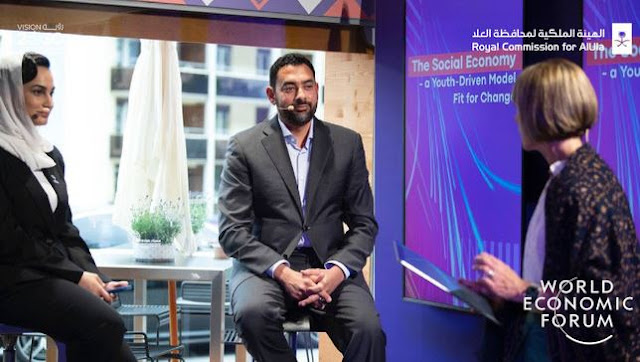Saudi Arabia’s head of the Royal Commission for AlUla has praised the role of arts and culture in sustaining resilient and creative communities, saying that investing in art creators is important to economies and to the healthy growth of societies.
Speaking during a livestreamed panel session called “Culture Shock” at the World Economic Forum in Davos on Tuesday, Amr Al-Madani described artists as “resilient,” adding that “art creators are essential contributors to the economy and healthy growth,” and “are as important as infrastructure and assets.”
He added: “For those who are in the investment world, your capital with the artists and creatives will always have much higher return than your capital invested anywhere else, in the long term.”
The panel session was moderated by Jeanne Bourgault, president and CEO of Internews.
Bourgault asked Al-Madani to outline cultural preservation initiatives as well as the economic development taking place as part of the regeneration of AlUla, Saudi Arabia’s first UNESCO World Heritage Site.
“To me, culture is really a manifestation of who we are as a society,” Al-Madani said.
“If we use the expansive definition of culture, it’s an ever-evolving implementation of where we have been, and who we have been, and where we intend to be.”
He said that this understanding is pivotal when working on a project that involves a World Heritage Site which has been “a capital of many ancient civilizations for thousands of years and a cultural capital of the world.”
The panel also featured Platon, the photographer and founder of the People’s Portfolio, a nonprofit organization that uses portrait photography to highlight humanitarian efforts worldwide.
Anna Konig Jerlmyr, Stockholm’s mayor, discussed the significance of the arts sector and how those in the arts industry had been hit by restrictions introduced to contain COVID-19.
Under the lockdown in March 2020, many theaters, cinemas, concert venues, book shops and museums were closed. This added to the burden facing artists struggling to make a living, and contributed to the revenue decline for cultural industries, she said.
However, the restrictions pushed artists to find more creative ways to reach those forced to remain home as a result of COVID-19 curbs.
Al-Madani said: “During the pandemic we believed that the loss of any creator was not acceptable.”
Throughout February and March, Desert X AlUla, a site-responsive, international open-air art exhibition, was staged in partnership with a California-based firm.
The event included galleries for female artists. More than half of the artists taking part were women, he added.




No comments:
Post a Comment